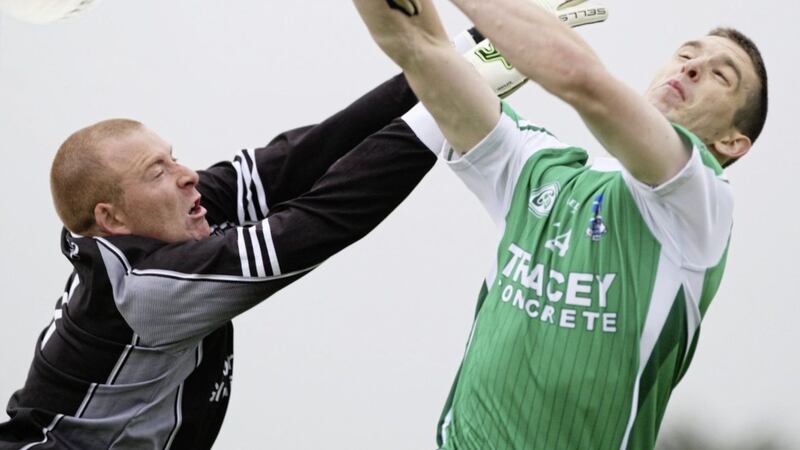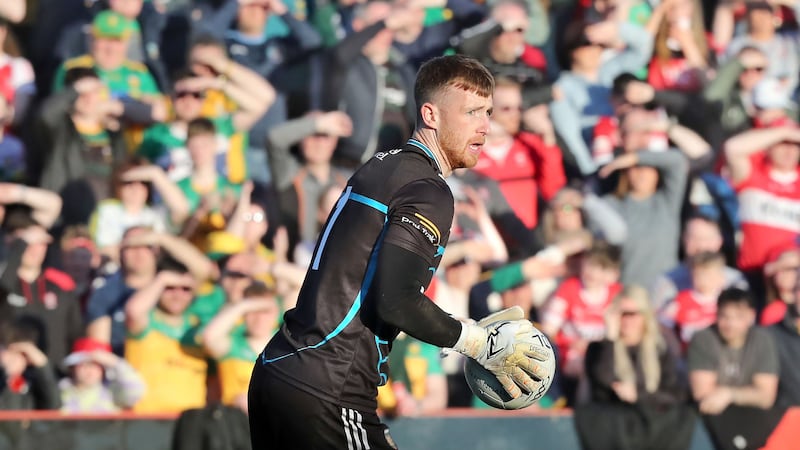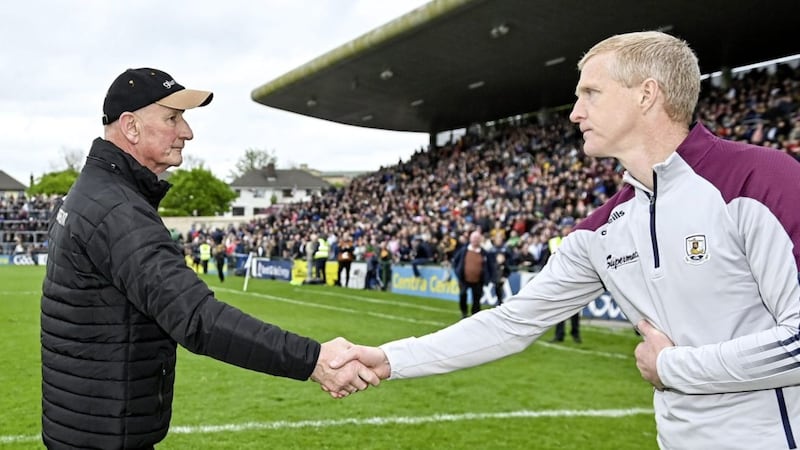2008 WAS already set to be a big year in Barry Owens’ life. He and wife-to-be Caroline, a Newtownbutler native that he had to go to a Robbie Williams concert in Slane to meet, were putting the finishes touches to the home in which they now raise twins Shea and Ava (4), and little brother James, who’s 2-and-a-half.
Come May they would get moved into their picturesque mountainside abode that sits right on the edge of Teemore territory near Derrylin. That was just in time to get settled in and ready for their wedding on Hallowe’en day.
When he was 14, he’d gone for an operation on his sinuses. When he was on the table ready to go into theatre, the heart monitor detected a murmur.
It required further investigation and for a while he attended the Clarke Clinic at the Royal Victoria Hospital, where Dr Casey looked after him.
“He found I had a blockage of my artery, so they had to do a coarctation, where they put a balloon up through the artery and blow it out.”
It was a short-term release. From he was 14 until he underwent the surgery at 26, it was monitored annually. Ordinarily, he could have gone on for a few years still, but playing inter-county football increased the risks.
“When they realised I was playing sport at a high level, they were afraid if I was going flat out and I got a rap that it might rupture. They just decided then to do the operation at that stage.”
He’d been aware for the 12 years in between that this day might come. And for a while in the middle, he briefly feared that it would be worse than just a few months out of football.
“I remember being told a few years before that I might have to give up football by one of the doctors in Belfast, but I got one of the Fermanagh doctors to look into it and they said I’d be alright. All I was worried about was missing football.”
When he rang Malachy O’Rourke to tell him that he wouldn’t be around for a while, the news didn’t sink in first time.
“I remember ringing him from Caroline’s house and telling him I wouldn’t be able to play because I need a heart operation. He sort of said ‘ah right, I’ll be chatting to you’ and he hung up.
“Then about five minutes later he rang back just to double check I was sure what I was on about.”
He went under the knife on January 28. Derry had just crossed into Fermanagh’s path for the first time that year, winning a McKenna Cup semi-final in Omagh a few days earlier.
At 9am, they took Barry Owens downstairs. Surgeons told him, his worried fiancée and parents that the aortic valve and route replacements would take eight or nine hours.
Nine hours passed. Ten. Eleven. Twelve. No word.
There was no donor so rather than replace the valve altogether, they could only repair one of the leaves. His heart was still leaking when they placed it back into his body so they had to do it again. Then he had to get a bit of the aorta taken out and replaced with a tube.
Eventually, after almost 13 hours, the news came back to his relieved family that the operation, which Club Eirne looked after to his deep gratitude, had been successful.
The test he had to pass before he was deemed fit to leave the clinic was to walk up a flight of stairs. A week on, he only had to try once to pass, but it was an indication of the length of the road ahead.
“You’d think no bother but when I got to the top of the stairs, I was f****d.
“It was tough. It was just like being a frail wee fella. When I got home they said to go out and do something every day, but even walking around the house I felt it tough. You’re saying ‘holy f***, this is gonna be hard’.”
To this day it affects his ability to cover the ground in the way he would once have, which chains back a natural greyhound whose weight has sat between 13-and-a-half and 14 stone since his late teenage years.
There’s not a pick on him as he lifts his top to reveal the eight-inch scar that runs from close to his collarbone to beyond the bottom of the rib cage.
A regular winner of 100m and 200m races at St Aidan’s High School in Derrylin, he’s also still joint-holder of the Teemore Primary School high jump record.
“Myself and another lad Conor Boyle got the record on the same day but because I got it first, I have it,” he laughs.
But long-distance running was never his forte. In cross country, he’d be down at the very back of the group, “second or third last”.
This, though, was a different sensation altogether. Even to this day, his lung capacity is reduced. Last October, he did a 5k at the club.
”I did it in 23 minutes, which wasn’t too bad, but I had to stop a couple of times and walk in the middle of it. I’d done nothing bar 5-a-side for maybe a month and a half before it so that maybe didn’t help.”
Yet within a couple of months he was back out at Lissan. With the house moved into, he set his eyes on what he could do for his county once more.
*******
OWENS was along with the squad in Parnell Park but not togged out as Fermanagh lost the Division Three final to Wexford.
As they trudged off disconsolately, Derry roared out from the corner of the old north Dublin ground and went on to claim the Division One crown, coming back from a poor start to take what seemed like a significant step forward against Kerry.
Few would have predicted at that stage that the best Oak Leaf hopes of a provincial title in all the years since 1998 would be smashed in Omagh eight weeks to the day later.
Fermanagh’s Ulster quarter-final win over Monaghan carried weight but with Derry going to Ballybofey and squeezing past their hosts, there were still few backing the men in green when they headed for Healy Park.
When June 21 came, Ronan Gallagher’s penalty save from Conleith Gilligan when the game was sitting within Derry’s grasp was the key moment of the first half, but still Fermanagh had trailed all the way until the 52nd minute.
Barry Owens was sprung from the bench but with the centre of their defence solid and needing something to get back in the game, he headed for the edge of the opposition square, in against Kevin McCloy.
He’d played a very odd game in the inside forward line for his club, almost always when he was hanging together with injury and just managing to get through a game, but nothing significant.
He was hardly on the field 60 seconds when Marty McGrath careered off down in front of the main stand. He gave it Mark Little, who popped it to Eamon Maguire. Barely 30 yards out, he cut in to shoot only for the effort to drop short.
“He mis-hit it,” says Owens, taking up the story.
“I remember me and McCloy were standing on the edge of the box, I just drifted behind him. Next thing the ball was coming in and I made the dart across the six yard box and got there before Gillis. He should have creamed me.
“I suppose I always had a good leap. I wasn’t that tall when I was growing up and that’s where I got my spring, I would have been playing at midfield against taller lads.
“It probably came from acting the eejit around home and down at the pitch.”
From there it was an heroic effort. Peter Sherry had been sent off but even with 14 men, they managed to cling on and repel wave after wave of Derry attack in the final 10 minutes, securing a famous 1-11 to 1-9 win and a first Ulster final place in 26 years.
“The commitment of the lads that day… You could feel in the camp that sense we were going to do something, even in the game.
“Lads were willing to do anything to get over the line. I remember there was one ball dropped short around the 21’ and Shane Goan went at it, for some reason, head first to try and block it.”
It was going to take that kind of insanity to pull off such a result, and what it ultimately represented was a gateway to the prospect of that elusive first ever Ulster title.
Having been introduced in the drawn decider with Armagh – a game in which the Ernemen came from eight down in - Owens was sprung at full-forward once more in the replay.
But he was only on the field eight minutes when he took Francie Bellew for a run out in front of the Gerry Arthurs Stand.
Shane Goan plays the pass down the line but the hop on the ball is higher than either of them expects.
“I did something I’d never have done at full-forward and would never do again. I went up to catch it and Francie Bellew went up and boxed it out of my hands. When I was coming down, I went to go and turn at the same time.
“People were saying Bellew had done me but he didn’t, he barely touched me. He had this reputation, people would say ‘aw he’s a dirty hoor’, but he never hit me once the whole time I was on him.”
“For two or three minutes the pain was horrendous. I got up to walk off but the knee felt like there was nothing there, so I got the stretcher off.
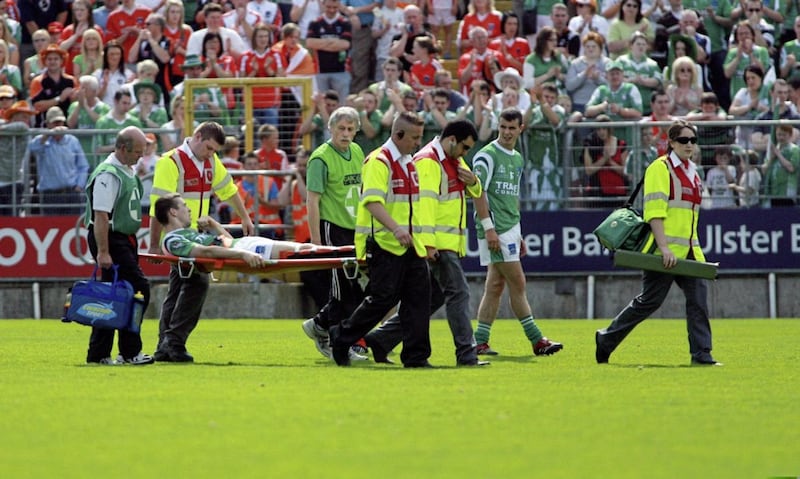
“I got crutches, put ice on it and sat on the bench and watched the end of the game.
“I had an inkling because Niall Bogue had just done his [cruciate] four or five months before it, and he’d explained the pain for two or three minutes. I was thinking ‘ah, two or three minutes’… You could more or less have said then. The wobbly knee was another sign.”
And so after getting through heart surgery, it would be a split-second twist that would wreck his year instead. He managed, at least, to escape the crutches in time for the wedding at the end of October.
He was back in action within nine months. But at the tail end of ’09, playing in a club game against Donagh, he took off to chase Fermanagh team-mate John Woods.
“He was running down the line and turned quickly, I turned with him and the knee buckled. Same knee.
“It felt fine. I didn’t think I’d done my cruciate. I came off but ended up playing a couple of matches after. The first time I was in agony, I couldn’t move.
“I got a scan and I thought it was going to be cartilage, and then I was told. I had to tell Malachy there wasn’t a hope I’d be playing that year.”
He spent almost the whole of Malachy O’Rourke’s time in charge on the sideline, and given how close they came in ’08 and their manager’s record before and after that, it eats at Fermanagh supporters that they lost their two-time Allstar full-back between the ages of 26 and 28.
*******
THE captaincy came his way in 2011. John O’Neill had been appointed and rang him on New Year’s Eve. He was delighted.
By the time championship came around, almost half the squad had defected. O’Neill had no choice but to send a bunch of rookie lambs to the slaughter in Celtic Park, although they claimed some respectability out of the second half.
“It was just a frustrating year. It’s all you can really say,” he ventures as he reaches to scratch his head still, seven years on.
“It was positive at the start but a couple of results went against us, players weren’t getting playing and they just opted out. Then there were things in papers, stories being told that weren’t happening.
“We just missed out on promotion by a win maybe and we’d taken Roscommon, this up and coming down, and lost by a point down there. Wicklow were going well and we drew that game when we were two points up and we threw it away.
“Those wee small things, if they’d gone different… we were coming out with the ball against Wicklow and dropped it, it ends up over the bar.
“We could have been promoted and things might have been different. We played Derry up there in the championship, it was a tough day. We had a lot of lads were very raw.”
It was a short summer, losing a first round qualifier to London. It was ground zero and 2012 followed a similar path, two championship games, neither of them successful.
Having been struggling with a bad shoulder throughout the season in 2013, the day he had he had to go along with the charade that he was alongside James Sherry and Tomás Corrigan in being set to start against Cavan, right up to the point of going through the pre-match parade, before taking a seat on the bench was a low point.
“We didn’t find out until the meeting beforehand, that day. It was the team that was put out.
“It kinda was embarrassing. I feel it doesn’t really make much difference because teams plan for it, they’ll know every player inside out.
“Peter [Canavan] wasn’t playing me because Brian Cox was playing well in defence and he was maybe keeping me on the bench because I could play full-back, midfield or full-forward.
“I don’t know if that was his thinking but I just never got a run at all. He was there to make those decisions, that’s the manager’s job at the end of the day.
“It was frustrating. We played a couple of challenge matches and I felt I did well in them. But it’s done and dusted.”
Unlike himself. The 2005 club championship victory with Teemore (they’ve lost five finals either side) is right at the head of his career highlights, not least because he made the decision to turn down a few dollars in America that summer.
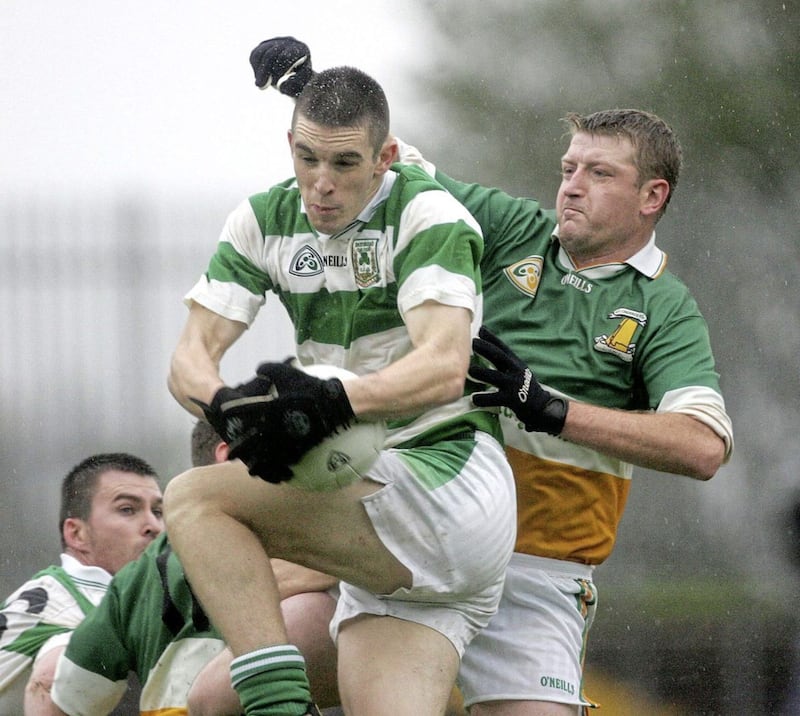
And in a way, that success was him at his best. A pulled hamstring two weeks before the semi-final became a full-on tear 10 minutes into that game. He couldn’t go on.
Twice in between then and the final he went to a laser clinic in Santry and got the muscles fused back together. He got through the game at corner-forward, the homebird helping his beloved club across the line.
“Since that I’ve probably had repercussions, scar tissue and that. I’d have a bad hamstring on that side. Worth it though. Big time.”
He’s still going for another season. And now after two years coaching the club’s minors, he’s in with the under-6s, Shea, Ava and James all tagging along. Keeps a hand in with Fermanagh’s under-16 squad too.
There’s just no stopping some men.
